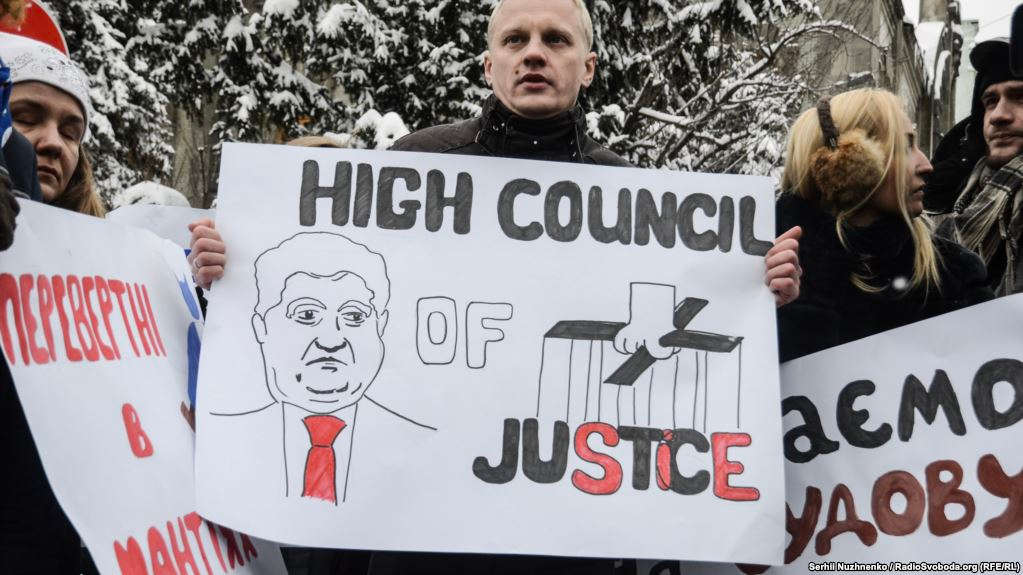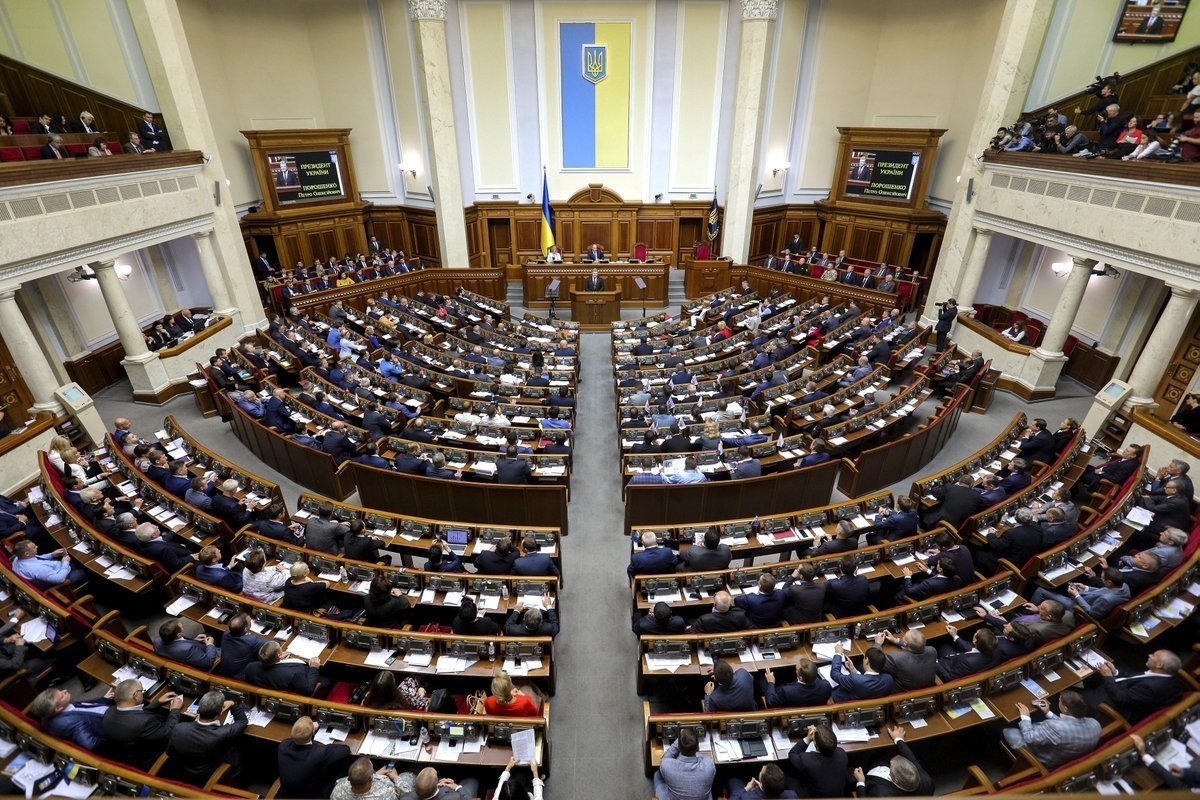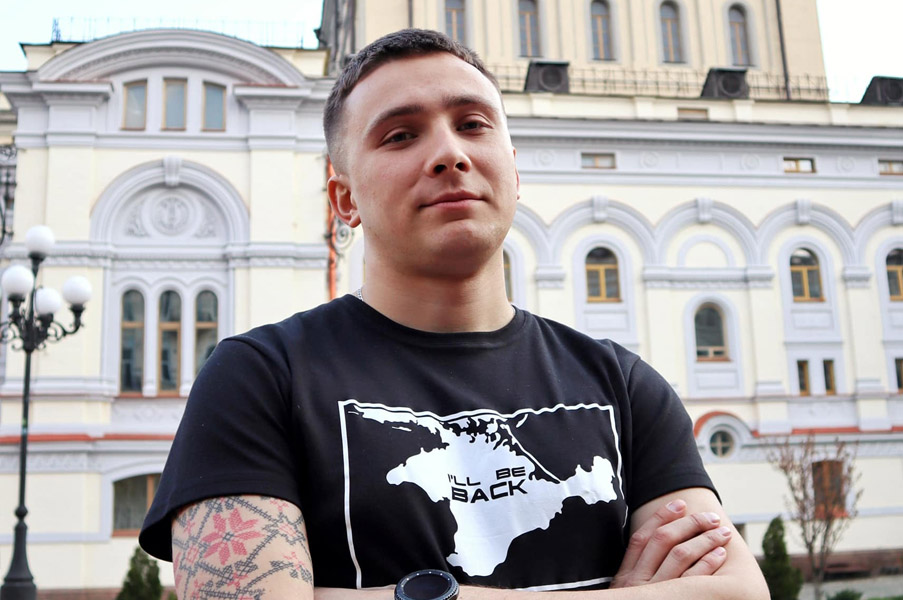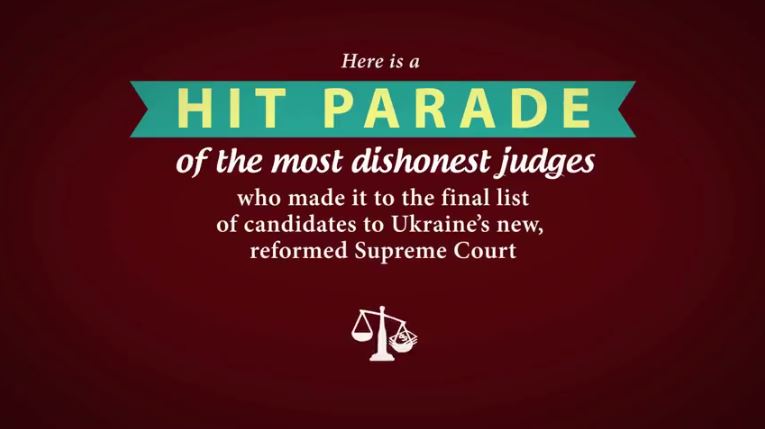Thus, will actual reform even occur in a setting of corrupt courts, corrupt law enforcement officials and an absence of legislation covering all of the work of anticorruption institutions? Ukrainians and Western partner states have their doubts.
Kyiv has begun the new year with festivities, gatherings of whole families around the Christmas tree on Sofiiska Maidan, and with a protest against regional police departments: several hundred people demanded a true and just investigation into and consequent punishment of the murderers (or murderer) of Iryna Nozdrovska, a lawyer who fought against judicial corruption.
In the new year Ukrainian courts have issued a dubious verdict in the case of the murder of journalist Viacheslav Veremii during the Revolution of Dignity: Yuriy Krysin, a “titushka” and the suspect implicated in this crime was given a sentence of four years imprisonment with a two year probation period, but he was effectively released inside the courtroom.
As Vitaliy Shabunin, the head of the Anti-Corruption Action Center, stated on the program “The Right to Justice”, the investigation into and sentencing of Krysin is the result of a corrupt system which should be protecting citizens of Ukraine. The Revolution of Dignity did not successfully vanquish corruption in judicial bodies. Throughout the four years since the Revolution of Dignity, only 10% of judges who issued sentences against Maidan Activists or who revoked drivers’ licenses from AutoMaidan activists were fired, Shabunin said.
“Judges are certain of their legal immunity and of the inability of civil society to oversee them. Returning to the Krysin trial: he was involved in the murder of a journalist – but this is apparently ‘hooliganism’ and carries only a 4-year conditional sentence. In the unprecedented case of Krysin the fault obviously lies on the prosecutor, who qualified Krysin’s actions as ‘hooliganism’,” Shabunin added.
As lawyers and law-enforcement officials recognize, not only Veremii’s murder case but cases involving the shootings of the Heavenly Hundred may soon finish altogether in a fiasco, so long as a whole line of systemic problems remain, the most important of which are the lack of political will to find and punish perpetrators, the ineffective management of investigations, the lack of professionalism in the Prosecutor’s Office, and corruption within the Judicial Branch of government. Yevheniia Zakrevska, a lawyer for the families of the Heavenly Hundred has written about this, as have others.
Experts have also restated that it was judicial corruption, not a failure to investigate or ineffective investigations, which led to cases into the murders of journalists Heorhiy Gongadze and Ihor Aleksandrov in the beginning of the 2000s to remain unresolved to this day. Lawyers, therefore, doubt whether the cases which resonate with society today will ever be resolved.
President Poroshenko: the work of reform is to “bring the courts to the people”
The government expects to overcome corruption in the Judicial Branch and to renovate the body of judges, and therefore to renew society’s faith in the courts, through the realization of relevant reforms. Thus, at the end of last year President Petro Poroshenko “allowed” the renovation of the Supreme Court and liquidated district courts, in place of which new administrative courts will begin to function, beginning in 2018.
“This is the second stage of judicial reform. The first stage was to form a new Supreme Court with unprecedented transparency, as I promised in the initiation of changes to the Constitution regarding the start of justice reform. Today the second stage has begun, which has the goal of bringing the courts and justice to the people. We will no longer have regions without courts or courts without judges,” Poroshenko explained as the work of judicial reform.
Nonetheless, as the Public Integrity Council reported, a quarter of judges in the renovated Supreme Court remain representatives of the “old” generation of judges, a generation prone to corruption and nepotism. Thus reformers have not yet successfully accomplished the change of the body of judges and the optimization of courts at different levels, experts warn.
Vitaliy Bala, a political scientist and the Director of the Agency for Situation Modeling stated on Radio Svoboda that the matter of justice reform involves not only the selection of new judges but the improvement of the base of legislation necessary for the new judges’ work, and a systemization in the implementation of reform.
“The matter is not limited to courts and judges – the matter involves the system in which they serve. Truly everything must be done systematically, and we must not strive to point out only those ‘specific’ things which do not have the predicted effect,” the expert said.
Still, one more problem linked to judicial reform is the launch of the Anticorruption Court: at the end of last year draft legislation for a High Anticorruption Court, prepared on the President’s command, was registered in the Verkhovna Rada. This project elicited criticism from civic organizations which engage in the struggle against corruption: in their opinions, the President’s draft legislation conflicts with the conclusion of the Venice Commission and does not guarantee the independence of the legal proceedings of the Anticorruption Court. Civic activists recommend that the President withdraw this legislation from the parliament.
“Having received the recommendations of the Venice Commission, the President took into account a portion of them, but another portion he approached ‘creatively’. The President presented his own vision (to avoid discussions about the constitutionality of the project), but this is a big plus. However, the jurisdiction of the Anticorruption Court infringes on the overwhelming majority of NABU cases. And the greatest risk is that, according to the President’s draft legislation, any conclusions reached by the Civil Council of International Experts can be overturned by 11 out of 16 votes by members of the High Qualification Commission of Judges [A government advisory body which oversees the selection (and disbarment) of judges – PK],” warned Yaroslav Yurchyshyn, the head Ukrainian Representative of the anti-corruption organization Transparency International.
Yurchyshyn further remarked that this is despite the fact that, unlike the judges of the High Qualifications Commission, the advisors on the Council of International Experts do not have family, friends or political allies who could become defendants in the Anticorruption Court.








